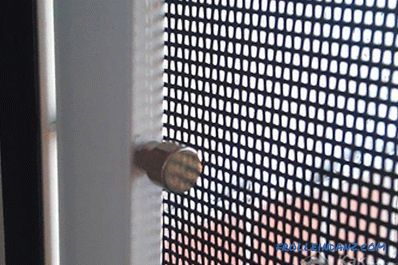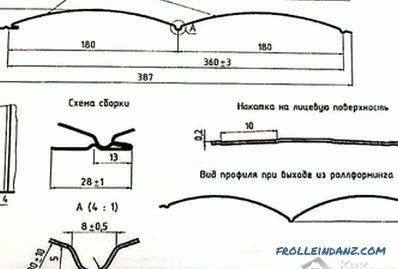A properly constructed piping system is only part of the job of organizing an uninterruptedly functioning water supply. The plumbing system must be warmed if it is laid above the level of soil freezing. Otherwise, in winter, during the period of severe frosts, the water in the pipes will freeze and tear them apart. And it does not matter from which pipe the network is made. Frost equally does not spare either metal pipes or plastic. In this article we will look at how to insulate a water pipe, and what kind of insulation there are.
What is used for insulation
Previously, water pipes were insulated with all available materials, which did not always bring a positive effect. Currently, the industry produces a huge amount of materials for thermal insulation. Let's take a closer look at them.
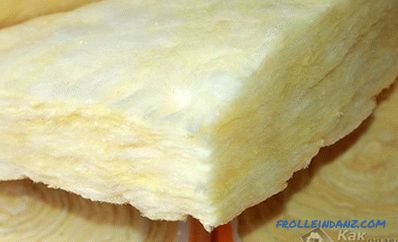 Glass wool
Glass wool
Many people remember domestic glass wool. It was almost impossible to work with her. Pieces of glass stuck into clothing and body, bringing unpleasant itching and pain. Modern glass wool in terms of much more convenient to use, for which she received great popularity among builders. Such insulation is produced in the form of plates or strips wound into a roll.
The low density of insulation does not allow it to be used for insulating pipelines without additional insulation materials. Insulated glass wool pipe is usually insulated from above with roofing felt or fiberglass.
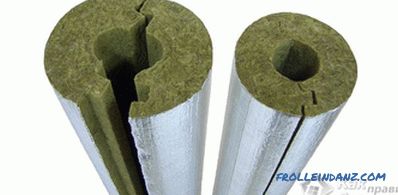 Basalt cylinder
Basalt cylinder
Basalt insulation of a cylindrical shape is made of fiber covered with foil or ruberoid. For installation, the insulation is selected according to the diameter of the pipe, which greatly facilitates the work with it. Because of its good performance, it is too expensive that not everyone can afford.
Expanded polystyrene shells are most popular with people who carry out the insulation of water pipes with their own hands. Insulation is designed for reusable use for exterior and interior works. Available in two types: with the outer layer of insulation or in pure form.
New product of domestic manufacturers - paint for heat insulation. It looks like gray paste. It is made from a mixture of varnish with fillers and an acrylic additive. The paint composition withstands the temperature drop, and one layer of the coating, on the basis of thermal conductivity, the manufacturers say, is equal to the glass wool layer. Apply a brush or a spray to a covering of the pipeline.
The problem of pipeline insulation can also be solved with the help of a heating cable. It is located along the entire length of the pipeline, and it works from connection to the electrical network. The power consumption of 1 m cable, on average, about 20 watts. It is included at negative temperatures in winter.
So, we got acquainted with the most popular materials for thermal insulation. Now let's look at how to apply them correctly.
Fiberglass insulation
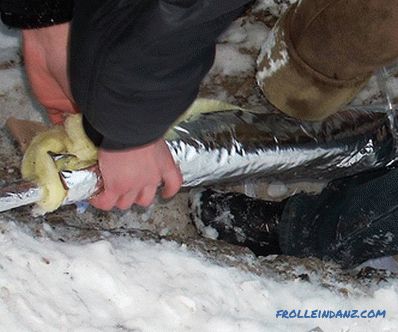 Insulation with glass wool
Insulation with glass wool
It is better to use glass wool for insulation , in attics and basements. For insulation of the plumbing under the ground this material is inappropriate to use. This is due to its weak density and ability to absorb water. Underground and melt water will saturate a layer of insulation, and by the winter frost it will not have time to dry. This threatens to freeze the water supply. If you still decide to use glass wool for an underground pipeline, you will have to impose waterproofing on top, which will lead to additional costs.
Glass wool should be cut into strips so that it is enough to wrap the entire tube. Having prepared such strips for the entire length of the water supply system, begin to wrap insulation around the pipe. To secure the glass wool from the top, wrap with plastic tape. Next, take the ruberoid or fiberglass of the required width and wind the insulating casing on top of the insulation, which also fasten with tape. Top of the finished casing cover waterproofing mastic.
This type of water supply system is better placed in trays. Otherwise, the earth layer with its weight will compress the top and bottom of the insulation, and its thickness will not be enough to fulfill its functions.
Using insulating shells
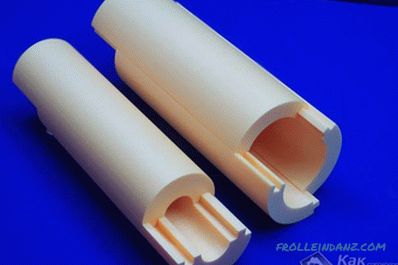 Extruded polystyrene shell
Extruded polystyrene shell
Much The best option for water-pipe insulation is the use of expanded polystyrene or basalt shells. Select the blanks of insulation according to the pipe diameter and stack them 200 mm apart from each other. To secure the blanks on the pipeline, use sanitary tape. At the corners and junctions fasten the molded shells of insulation.
After backfilling with earth, the insulation keeps its shape and does not collapse under the weight of the soil. And when the groundwater rises, the shell absorbs only 0.5‒2% of the moisture from the available volume per day.
Heat-insulating paint
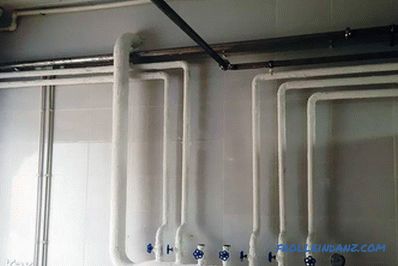
Insulation of plumbing with paint is a fairly simple method of insulation.Paint a paintbrush or a spray paint on the entire surface of the pipe and let it dry. For more warmth you can add a few more layers later.
The more paint layers, the better it will retain heat. In addition, such a coating will keep metallic water pipes from corrosion.
Laying the heating cable
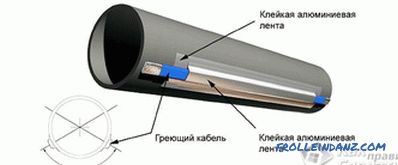 Warming scheme with the heating cable
Warming scheme with the heating cable
Insulation Plumbing heating cable is considered an effective method, although very expensive. The cable is laid on top of the pipe or inside. But self-styling is very difficult to perform, mostly applied exterior styling. Pipes with a built-in cable or an empty channel for self-assembly of the heating element are on sale. Before independent performance of such works, it is better to watch the video. For example, such:
Consider the simplest way of laying the cable:
- Wrap the entire length of the water supply system with foil tape in a spiral with a step of 10 cm.
- Wrap the cable over the foil and reinforce it with the same foil on top. You should have a double foil helix with a heating cable in the middle.
- To preserve heat from above, the water supply system is wound with insulation and sanitary tape. Wash tape must overlap so that the moisture does not get inside the insulation.
- Pull the cable connecting cable from under the foundation to the switchboard through the water inlet to the house.
The application of a heating cable will not only warm your water supply system, but also warm it if it is accidentally frozen.
Insulation of the entrance to the house
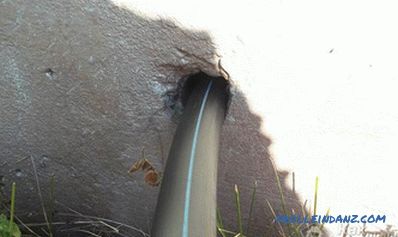
Insulate the entrance of the water supply system to the house using a duct built at the site of the entrance of the pipe for the foundation. You put insulation in the box and cover it with a removable lid on top. If you do not want to spoil the appearance of the house box, you can use a sewer pipe of larger diameter. The pipe is cut lengthwise and put on the water pipe so that it is exactly in the middle. You got a casing that you fill with foam. So that the rodents do not spoil the insulation, cover their design with concrete with broken glass.
Having completed the insulation of the water supply, you can not be afraid of the arrival of even the most fierce winter.
Video
In addition, we advise you to watch the video about the features of water input into the house:


